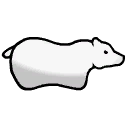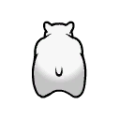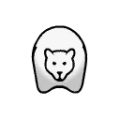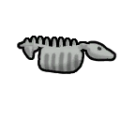Difference between revisions of "Polar bear"
| (2 intermediate revisions by 2 users not shown) | |||
| Line 56: | Line 56: | ||
| livesin_seaice = 0.1 | | livesin_seaice = 0.1 | ||
}} | }} | ||
| − | '''Polar bears''' are huge solitary [[omnivore]]s found in {{Habitats}}. | + | '''Polar bears''' are huge solitary [[omnivore]]s found in {{Habitats}}. They are identical to a [[grizzly bear]], except for their appearance, habitat, comfortable temperature range, and wildness (85% versus 80% for a grizzly bear). |
== Taming == | == Taming == | ||
| Line 62: | Line 62: | ||
== Analysis == | == Analysis == | ||
| − | Due to the food- | + | Due to the food-scarce environments they inhabit (like an [[ice sheet]]), polar bears are likely to hunt your animals and colonists for their need of food. Keep a good watch on polar bears when first settling on a frozen biome. |
If they can be fed and successfully obtained, despite their {{%|{{P|Turn Manhunter Chance When Taming}} }} [[Mental break#Manhunter|manhunter]] chance on failed taming attempts, bears make decent haulers and good melee blockers. | If they can be fed and successfully obtained, despite their {{%|{{P|Turn Manhunter Chance When Taming}} }} [[Mental break#Manhunter|manhunter]] chance on failed taming attempts, bears make decent haulers and good melee blockers. | ||
| + | |||
| + | === Comparison to other haulers === | ||
| + | {| class="wikitable sortable" | ||
| + | ! Animal !! Carrying Capacity !! Move Speed !! Hunger Rate !! <abbr title="How often the animal forgets a stage of training in days">Training Decay</abbr> | ||
| + | |- | ||
| + | | '''Bear''' || {{Q|Grizzly bear|Carrying Capacity}} || {{Q|Grizzly bear|Move Speed Base}} || {{Q|Grizzly bear|Real Hunger Rate}} || {{#expr:12 - 6*{{Q|Grizzly bear|Wildness}} round 1}} | ||
| + | |- | ||
| + | | [[Timber wolf|Wolf]] || {{Q|Timber wolf|Carrying Capacity}} || {{Q|Timber wolf|Move Speed Base}} || {{Q|Timber wolf|Real Hunger Rate}} || {{#expr:12 - 6*{{Q|Timber wolf|Wildness}} round 1}} | ||
| + | |- | ||
| + | | [[Cougar]]/[[panther]] || {{Q|Cougar|Carrying Capacity}} || {{Q|Cougar|Move Speed Base}} || {{Q|Cougar|Real Hunger Rate}} || {{#expr:12 - 6*{{Q|Cougar|Wildness}} round 1}} | ||
| + | |- | ||
| + | | [[Husky]] || {{Q|Husky|Carrying Capacity}} || {{Q|Husky|Move Speed Base}} || {{Q|Husky|Real Hunger Rate}} || {{#expr:12 - 6*{{Q|Husky|Wildness}} round 1}} | ||
| + | |- | ||
| + | | [[Labrador retriever]] || {{Q|Labrador retriever|Carrying Capacity}} || {{Q|Labrador retriever|Move Speed Base}} || {{Q|Labrador retriever|Real Hunger Rate}} || {{#expr:12 - 6*{{Q|Labrador retriever|Wildness}} round 1}} | ||
| + | |} | ||
| + | |||
| + | === Comparison to other bulky attackers === | ||
| + | {| class="wikitable sortable" | ||
| + | ! Animal !! Health Scale !! DPS !! Move Speed !! Hunger Rate !! <abbr title="How often the animal forgets a stage of training in days">Training Decay</abbr> | ||
| + | |- | ||
| + | | [[Thrumbo]] || {{Q|Thrumbo|Health Scale}} || {{Q|Thrumbo|Mob Average DPS}} || {{Q|Thrumbo|Move Speed Base}} || {{Q|Thrumbo|Real Hunger Rate}} || {{#expr:12 - 6*{{Q|Thrumbo|Wildness}} round 1}} | ||
| + | |- | ||
| + | | [[Megasloth]] || {{Q|Megasloth|Health Scale}} || {{Q|Megasloth|Mob Average DPS}} || {{Q|Megasloth|Move Speed Base}} || {{Q|Megasloth|Real Hunger Rate}} || {{#expr:12 - 6*{{Q|Megasloth|Wildness}} round 1}} | ||
| + | |- | ||
| + | | [[Elephant]] || {{Q|Elephant|Health Scale}} || {{Q|Elephant|Mob Average DPS}} || {{Q|Elephant|Move Speed Base}} || {{Q|Elephant|Real Hunger Rate}} || {{#expr:12 - 6*{{Q|Elephant|Wildness}} round 1}} | ||
| + | |- | ||
| + | | [[Rhinoceros]] || {{Q|Rhinoceros|Health Scale}} || {{Q|Rhinoceros|Mob Average DPS}} || {{Q|Rhinoceros|Move Speed Base}} || {{Q|Rhinoceros|Real Hunger Rate}} || {{#expr:12 - 6*{{Q|Rhinoceros|Wildness}} round 1}} | ||
| + | |- | ||
| + | | '''Bear''' || {{Q|Grizzly bear|Health Scale}} || {{Q|Grizzly bear|Mob Average DPS}} || {{Q|Grizzly bear|Move Speed Base}} || {{Q|Grizzly bear|Real Hunger Rate}} || {{#expr:12 - 6*{{Q|Grizzly bear|Wildness}} round 1}} | ||
| + | |} | ||
| + | |||
| + | Neither Elephants or Rhinoceroses are tolerant of the cold environments where Polar Bears are likely to be found, requiring additional construction work to effectively allow their use as alternatives. | ||
| + | |||
| + | == Attacks == | ||
| + | Polar bears have two attacks: scratch (paw) and bite (teeth). Both attacks apply a stun for 7 seconds on their first strike when hunting. | ||
== Training == | == Training == | ||
| Line 70: | Line 105: | ||
== Health == | == Health == | ||
| − | {{Animal Health Table}} | + | {{Animal Health Table|QuadrupedAnimalWithPaws}} |
== Gallery == | == Gallery == | ||
Latest revision as of 22:03, 17 September 2024
Polar bear
A great white bear adapted for frozen climates. Their thick blubber and fur keep them warm in winter.
While their usual diet consists of fish and scavenged meat, the polar bear can also use its massive strength and deadly claws to kill live prey. They are startlingly quick for such lumbering creatures.
Base Stats
- Type
- Animal
- Flammability
- 70%
Pawn Stats
- Combat Power
- 200
- Move Speed
- 4.6 c/s
- Health Scale
- 250% HP
- Body Size
- 2.15
- Mass - Baby
- 25.8 kg
- Mass - Juvenile
- 64.5 kg
- Mass - Adult
- 129 kg
- Carrying Capacity
- 161
- Filth Rate
- 4
- Hunger Rate
- 0.56 Nutrition/Day
- Diet
- omnivorous, ovivorous
- Life Expectancy
- 22 years
- Manhunter Chance
- 50%
- Manhunter Chance (Taming)
- 30%
- Trainable Intelligence
- Advanced
- Wildness
- 85%
- Minimum Handling Skill
- 8
- Mate Interval
- 12 hours
- Maturity Age
- 0.5 years (30 days)
- Juvenile Age
- 0.2 years (12 days)
- Comfortable Temp Range
- -55 °C – 40 °C (-67 °F – 104 °F)
Production
Melee Combat
- Attack 1
- Front left paw
17 dmg (Scratch)
25 % AP
2 second cooldown
Stun for 280 ticks (4.67 secs) on first strike - Attack 2
- Front right paw
17 dmg (Scratch)
25 % AP
2 second cooldown
Stun for 280 ticks (4.67 secs) on first strike - Attack 3
- Teeth
23.6 dmg (Bite)
35 % AP
2.6 second cooldown
0.5 chance factor
Stun for 280 ticks (4.67 secs) on first strike - Attack 4
- Head
11 dmg (Blunt)
16 % AP
2 second cooldown
0.2 chance factor - Average DPS
- 5.3754
- tradeTags
- AnimalUncommon, AnimalFighter
Polar bears are huge solitary omnivores found in cold bogs, tundra, ice sheets, and sea ice. They are identical to a grizzly bear, except for their appearance, habitat, comfortable temperature range, and wildness (85% versus 80% for a grizzly bear).
Taming[edit]
- Polar bears can be tamed wild, randomly join your colony in an event, or be bought pre-tamed from a trader.
Analysis[edit]
Due to the food-scarce environments they inhabit (like an ice sheet), polar bears are likely to hunt your animals and colonists for their need of food. Keep a good watch on polar bears when first settling on a frozen biome.
If they can be fed and successfully obtained, despite their 30% manhunter chance on failed taming attempts, bears make decent haulers and good melee blockers.
Comparison to other haulers[edit]
| Animal | Carrying Capacity | Move Speed | Hunger Rate | Training Decay |
|---|---|---|---|---|
| Bear | 161 | 4.6 | 0.56 | 7.2 |
| Wolf | 64 | 5 | 0.29 | 6.9 |
| Cougar/panther | 75 | 5 | 0.32 | 7.2 |
| Husky | 64 | 5 | 0.8 | 12 |
| Labrador retriever | 56 | 5 | 0.64 | 12 |
Comparison to other bulky attackers[edit]
| Animal | Health Scale | DPS | Move Speed | Hunger Rate | Training Decay |
|---|---|---|---|---|---|
| Thrumbo | 8 | 6.882 | 5.5 | 2.8 | 6.1 |
| Megasloth | 3.6 | 6.126 | 4.8 | 1.6 | 6.2 |
| Elephant | 3.6 | 5.816 | 4.8 | 2.57 | 7.5 |
| Rhinoceros | 3.5 | 5.481 | 5 | 1.71 | 6.6 |
| Bear | 2.5 | 5.375 | 4.6 | 0.56 | 7.2 |
Neither Elephants or Rhinoceroses are tolerant of the cold environments where Polar Bears are likely to be found, requiring additional construction work to effectively allow their use as alternatives.
Attacks[edit]
Polar bears have two attacks: scratch (paw) and bite (teeth). Both attacks apply a stun for 7 seconds on their first strike when hunting.
Training[edit]
This animal can be trained as follows:
| Guard: | |
|---|---|
| Attack: | |
| Rescue: | |
| Haul: | |
*As of version 1.1.2610, all animals can be tamed. The percentage of likelihood of success depends on factors such as the Animals Wildness Percentage, Pawn Handling Skill, and others. More information can be found on the animals page.
Health[edit]
| Part Name | Health | Quantity | Coverage[1] | Target Chance[2] | Subpart of | Internal | Capacity[3] | Effect if Destroyed/Removed |
|---|---|---|---|---|---|---|---|---|
| Body | 100 | 1 | 100% | 26% | N/A[4] | - | Death | |
| Spine | 62.5 | 1 | 3% | 3.0% | Body | Moving |
−100% Moving[5] | |
| Stomach | 50 | 1 | 3% | 3.0% | Body | Digestion |
−50% Digestion | |
| Heart | 37.5 | 1 | 3% | 3.0% | Body | Blood Pumping |
Death | |
| Lung | 37.5 | 2 | 3% | 3.0% | Body | Breathing |
−50% Breathing. Death if both lost | |
| Kidney | 37.5 | 2 | 3% | 3.0% | Body | Blood Filtration | −50% Blood Filtration. Death if both lost | |
| Liver | 50 | 1 | 3% | 3.0% | Body | Digestion |
Death | |
| Neck | 62.5 | 1 | 22% | 22% | Body | Eating Talking Breathing |
Death | |
| Head | 62.5 | 1 | 75% | 9.9% | Neck | - | Death | |
| Skull | 62.5 | 1 | 25% | 1.2375% | Head | - | Cannot be destroyed Increasing Pain based on damage. | |
| Brain | 25 | 1 | 70% | 2.8875% | Skull | Consciousness |
Death Damage always results in scarring. | |
| Eye | 25 | 2 | 12% | 0.495% | Head | Sight |
−25% Sight. −100% if both lost. Damage always results in scarring. 0% Hit Chance against Blunt damage. | |
| Ear | 30 | 2 | 8% | 0.33% | Head | Hearing |
−25% Hearing. −100% if both lost. −15 Disfigured Social penalty | |
| Nose | 25 | 1 | 10% | 0.4125% | Head | - | −15 Disfigured Social penalty | |
| AnimalJaw | 25 | 1 | 10% | 0.4125% | Head | Manipulation |
−100% Manipulation. Can no longer use Bite attack. | |
| Front Leg | 75 | 2 | 7% | 5.95% | Body | Moving |
−25% Moving. −50% if both lost. Can no longer use paw attack[6] | |
| Front Paw | 25 | 2 | 15% | 1.05% | Front Leg | Moving |
−25% Moving. −50% if both lost. | |
| Rear Leg | 75 | 2 | 7% | 5.95% | Body | Moving |
−25% Moving. −50% if both lost | |
| Rear Paw | 25 | 2 | 15% | 1.05% | Rear Leg | Moving |
−25% Moving. −50% if both lost |
- ↑ Coverage determines the chance to hit this body part. It refers to the percentage of the super-part that this part covers, before its own sub-parts claim their own percentage. For example, if the base coverage of the super-part is 100%, and the coverage of the part is 20%, 20% of hits would hit the part, and 80% the super-part. If the part had its own sub-part with 50% coverage, the chances would be 10% sub-part, 10% part, 80% super part.
- ↑ Target Chance is the actual chance for each part to be be selected as the target when each part's coverage has been taken into account(I.E. Neck covers 7.5% of Torso but Head covers 80% of Neck so it actually has only a 1.5% chance to be selected). This is not pure hit chance, as different damage types propagate damage in different ways. See that page for details.
- ↑ Note that capacities can affect other capacities in turn. Only the primary effect is listed. See specific pages for details.
- ↑ This is the part that everything else connects to to be considered 'connected'.
- ↑ If Moving drops below 16% a pawn cannot move.
- ↑ A Scratch attack that varies from animal to animal. Each front paw allows one attack.
Gallery[edit]
Trivia[edit]
- While in real life polar bears are significantly larger than grizzly bears, in RimWorld they are identical save for their habitat and cold resistance.




